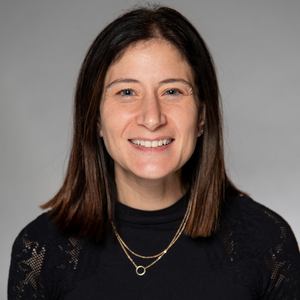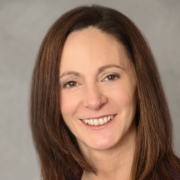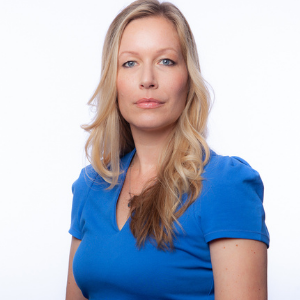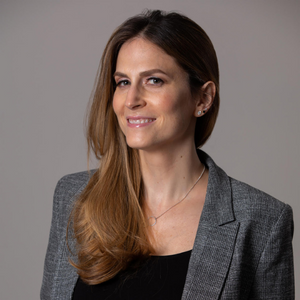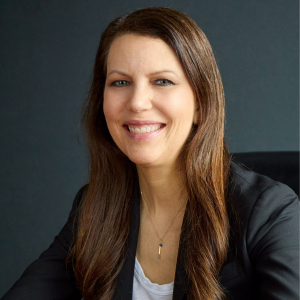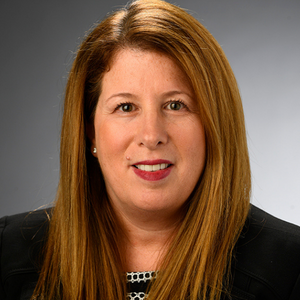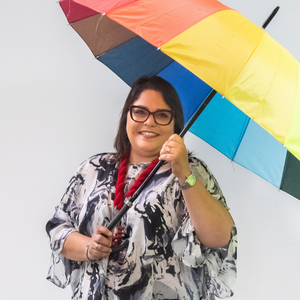Tiffany Fleming: Vice President, Client Onboarding & Trading Documentation, PGIM Fixed Income
 “As leaders, we have to be willing to hear some difficult things and have better self-awareness, which isn’t always easy,” says Tiffany Fleming. “If we do, we can become better leaders by being open-minded to making changes based on what people are telling us. This has enabled me to take pride in the leader that I’ve become.”
“As leaders, we have to be willing to hear some difficult things and have better self-awareness, which isn’t always easy,” says Tiffany Fleming. “If we do, we can become better leaders by being open-minded to making changes based on what people are telling us. This has enabled me to take pride in the leader that I’ve become.”
Following in Her Mother’s Footsteps
Prudential runs in Fleming’s family. Growing up, Fleming’s mother worked for Prudential while raising three children as a single mom. Fleming dreamed to follow in her mother’s footsteps but wanted to pave her own way by earning a job based on her own merit.
At a career fair at 16-years old, Fleming omitted her mother’s name from her Prudential application and accepted a position in Human Resources as part of a co-op program where she worked after school. Looking back, Fleming smiles when remembering her mother’s excitement, which turned to frustration, when she found out she would not be receiving the employee referral benefits.
After graduating from college and holding various positions within Human Resources, Fleming accepted a full-time position with the Prudential Mutual Fund Investment Management department (now PGIM Fixed Income), after she became the first person in her family to graduate from college.
From Self-Criticism to Self-Encouragement
“Throughout my 33-year tenure at Prudential, I’ve held different roles that have helped me identify my strengths and areas of improvement,” she says. “We all have areas that we feel comfortable and confident in – where we’re on our A game – as well as those areas where we’re not.”
Stepping into those areas has been tricky. Especially once Fleming was asked to take on a new role, with a new manager, after working for the same one for most of her career. In this role, she was given the opportunity to take on a stretch assignment, working with the COO of Fixed Income, doing management fee work, which she thought was totally outside of her wheelhouse.
She went in feeling worried about failing. Months later, when asked if she thought she did a good job, Fleming responded that the assignment didn’t represent her best work. She was asked who told her this, and it was then she realized that the expectations that she placed on herself weren’t always what others expected.
“Even when he told me I did a really good job, I still didn’t feel like I did. However, I must have done a good job because I ended up getting promoted shortly thereafter,” she reflects. “I’ve learned that sometimes the expectations I have for myself are not the expectations others have for me, and I need to embrace that more.”
Fleming admits that sometimes she still puts too much pressure on herself and used to turn to her mom for reassurance and guidance before losing her to breast cancer when she was just 30-years old.
“My mother played a really big role in my life, giving me positive reassurance and building up my confidence. She always acknowledged when I did a good job and that she was proud of me,” she recalls.
Since her mother’s passing, Fleming has worked on reprograming herself to find that voice of self-confidence from within. “When I do find it, it tells me that I can do anything I put my mind to, which is exactly what I always tell my four daughters.”
From Productivity-Focused to People-Focused
As a leader, Fleming is empathetic and encourages the people around her – but it wasn’t always that way. In her early years of leadership, she was so tough that she found out her team nicknamed her, “the warden.”
“When I first started at PGIM, I was very demanding. I was all about getting the work done by all means necessary, and I didn’t think much about the people aspect,” she says. “I had blinders on. I was tunnel-focused on the results I could generate and how much I could do.” It was not until one of her direct reports gave her feedback that they did not feel seen or appreciated that she took the time to reflect, becoming more aware, which ultimately contributed to a change in her management style.
“This feedback made me realize that I was not the type of leader that I wanted to be. It made me realize that you’re only as good as the people that you work with and for,” she says. “I didn’t put the same focus on people as I placed on getting the work done. I wasn’t very aware of how I made other people – the ones I interacted with daily – feel. It takes teamwork, collaboration and partnership – without those things, you can’t get much done.”
The other catalyst in softening her leadership approach was becoming a mother. She notes that even her Myers Briggs personality test results, before and after motherhood, are like night and day.
“Becoming a mom was a life-changing event that required me to step back and really look at myself. It changed how I viewed work, the world and life in general,” she says. “Today, I ask how I can be a better manager, provide opportunities, coach and develop my team. People first. Work, second. When people feel supported by their managers, it tends to increase how fulfilled they are by the work they’re doing.”
Looking back, Fleming’s biggest regret is that she did not realize sooner how important it is to support people – but now it is her passion. When she moved into a new role in 2020, she didn’t realize how much her team enjoyed working with her. In fact, many members of her team mourned her departure – a testament to her growth as a leader.
Champion of Inclusivity
Fleming never appreciated how much being a Black woman in a senior leadership role inspires others. To her, it was where she was always headed.
“Although My mom would encourage me to do a good job and work hard, she didn’t stress that I had to work harder or differently than others to be recognized, rewarded and valued. She taught me to be a good, caring and kind person to get ahead, so, I didn’t have the awareness that I think others did.” Fleming added, “It was much later that I started to realize the subtleties of being a woman – and being a Black woman – and how, in some cases, I would feel excluded, not considered or given the same opportunities as my peers.”
With Diversity, Equity and Inclusion (DEI) continuing to increase in importance and visibility, Fleming has made it her mission to lead with a “people-first” mindset that is inclusive of all backgrounds when growing talent. “There are so many areas of diversity that I’m continuing to learn about. My children are teaching me things about diversity that I had not been exposed to,” she says. “I’m so motivated by feeling like I am a part of something bigger than myself, and it’s important that others have the opportunity to share that same feeling – the feeling of being part of the team.”
Currently, Fleming is a member of the Culture Council, in which she was a founder and co-head, a sponsor of PGIM Fixed Income’s Black Professional Alliance affinity group and a member of the Black Executive Leadership team at PGIM Fixed Income. In addition, she is proud to serve as an ally to other affinity groups. “I’m an ally of every walk of life. I enjoy meeting new people, learning about different cultures and forming connections about how much we have in common.”
Stretching Her Comfort Zone – Again
In January 2020, Fleming decided to step out of her comfort zone again. She accepted a role in Client Onboarding after having spent more than 25 years in Operations.
“I kept saying, ‘Why would I do this to myself? I have another eight to ten years before I retire. Why would I take on a new role, possibly not do well and risk my reputation that has taken so long to build?’” she says. “My husband said to me, ‘Why wouldn’t you?’”
It was then she realized that this role, although challenging and outside of her wheelhouse, would enable her to learn and grow. “I can’t be someone who preaches to my kids about how you can do anything if you put your mind to it, work hard and take chances, and that the worst that can happen is it doesn’t work out. How could I not take my own advice?” she says.
So, Fleming took the plunge, taking on a new role right before the pandemic hit. More than three years later, she is still judging herself for being out of her comfort zone: feeling like she always has more to learn and is not performing at her true best. Yet, she is getting the same feedback that she is doing great. She has a supportive manager and is encouraged that her team members admire how easy she makes it look to excel in her role while juggling her husband, three younger children (who are highly involved in high school athletics), grandchildren and her 80-pound super doodle, Oreo, who is the love of her life.
“I’ve realized that others look to me as an inspiration, and I have that influence,” she says. “If they see that they too can be successful as a mom, a wife and a grandmother, it makes me feel good. I am learning not to downplay my capabilities or others.”
Not Counting Herself – Or Others – Out
One of Fleming’s daughters taught her a lesson in not underestimating yourself or others. Recently, at a track meet, Fleming assumed her daughter wouldn’t make it to the finals, although she did not share this with her. After all, she was up against a lot of girls who were much older than her and had faster times –they were stiff competition. However, her daughter defied Fleming’s expectations, and not only made it to the finals, but took home bronze and won a school grant. This taught Fleming that all things are possible with hard work and when you believe in yourself.
“I tell my children not to count themselves out, so how could I?” she reflects. “I need to remember how strong that voice that I dig deep inside of me is – that voice that empowers me to accomplish my goals is the same one I am teaching my daughters to use to accomplish theirs.”
By Aimee Hansen

